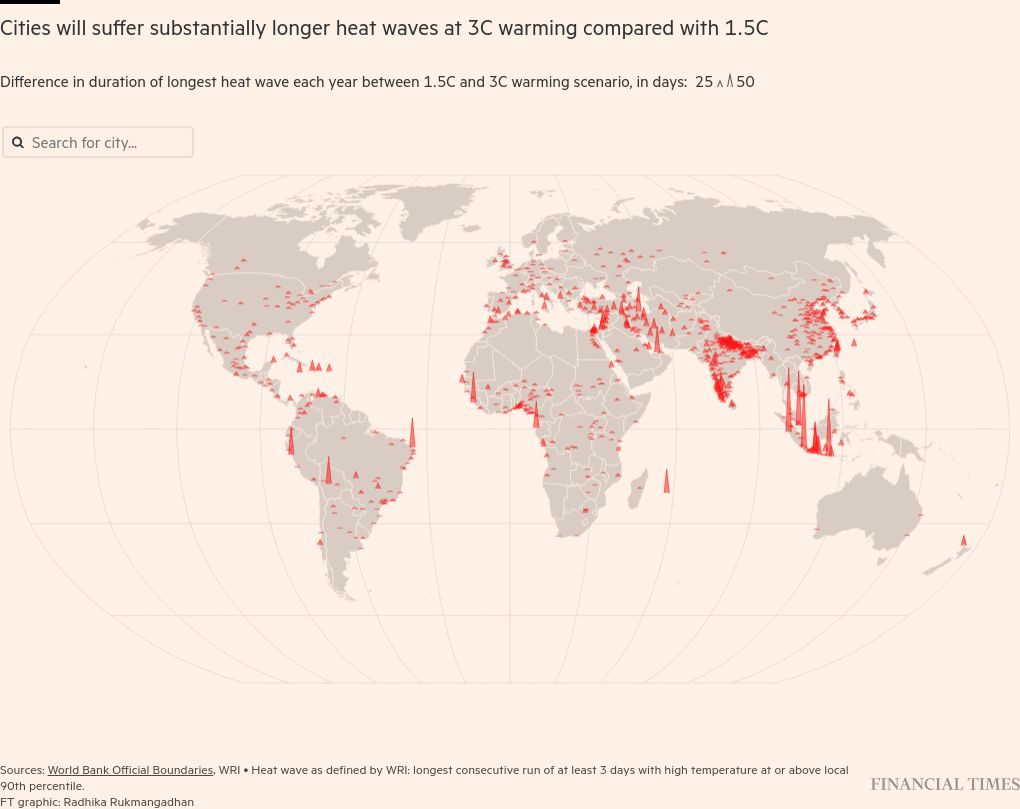UN warns of 3.1C temperature rise

Stay informed with free updates
Simply sign up to the Climate change myFT Digest — delivered directly to your inbox.
The world is on course for a “catastrophic” temperature rise of more than 3C above pre-industrial levels, or twice a goal set by the Paris agreement, according to a UN report that stepped up warnings that time was running out to address climate change.
The latest research by the UN Environmental Programme found the world’s ability to remain within the target of 1.5C of global warming “will be gone within a few years” without rapid action.
The conclusions are based on the so-called emissions gap, or the difference between the level of the greenhouse gases humans are adding to the atmosphere compared with what scientists say the levels must be to curb the heating of the planet. Already the long-term average temperature rise was put at 1.1C in a 2021 landmark report signed off by almost 200 countries.
While it was still “technically possible to meet” the Paris agreement 1.5C target, this would require a huge effort from the G20 countries responsible for almost 80 per cent of global emissions, the latest UN report said.
“Climate crunch time is here. We need global mobilisation on a scale and pace never seen before — starting right now, before the next round of climate pledges — or the 1.5C goal will soon be dead and well below 2C will take its place in the intensive care unit,” said Inger Andersen, UNEP executive director.
If governments fully implemented their existing climate plans the temperature rise could be limited to 2.6C, UNEP said. But continuing with current policies would lead to 3.1C of warming, the research found. This is slightly worse, at 0.1C higher than its emissions gap report a year ago.
UN secretary-general António Guterres said the report was clear that “we are teetering on a planetary tight rope”.
“We’re playing with fire, but there can be no more playing for time. We’re out of time,” he added.
Greenhouse gas emissions rose to a record 57.1bn tonnes of carbon dioxide equivalent in 2023, despite global pledges to cut emissions. But nations must collectively slash emissions by 42 per cent by 2030 and by 57 per cent by 2035 from 2019 levels, to keep within the 1.5C threshold, the report found.
If the temperature rise reaches 2C, scientists have predicted devastating impacts for countries and biodiversity, including reduced crop yields, while more than a third of the world’s population will be exposed to extreme heat.
The research was published just weeks before almost 200 countries are expected at the UN COP29 climate summit in Baku and a deadline for upgraded national climate plans to be submitted by February 2025.
Andersen said the world must not give up on the push to achieve net zero emissions, even as remaining within 1.5C of warming became increasingly unachievable.
“Every fraction of a degree avoided counts in terms of lives saved, economies protected, damages avoided, biodiversity conserved and the ability to rapidly bring down any temperature overshoot,” she said.
The UNEP report estimated the global investment needed for a net zero emissions transition was $900mn to $2.1tn each year between 2021 and 2050. This would, however, offset the significant costs from climate change, air pollution, damage to nature and human health impacts.
Every year that countries failed to cut emissions would mean even sharper cuts were needed, it noted.
Positive aspects of the report identified the ramp-up in the deployment of solar panels and wind energy could deliver 27 per cent of the total reduction of emissions needed by 2030 and 38 per cent in 2035.
Other constructive measures included improving energy efficiency, further electrification and fuel switching across homes, transport and industry.
Climate Capital

Where climate change meets business, markets and politics. Explore the FT’s coverage here.
Are you curious about the FT’s environmental sustainability commitments? Find out more about our science-based targets here
#warns #3.1C #temperature #rise





